By Joceylne Tenkouano, buildOn Burkina Faso Country Director
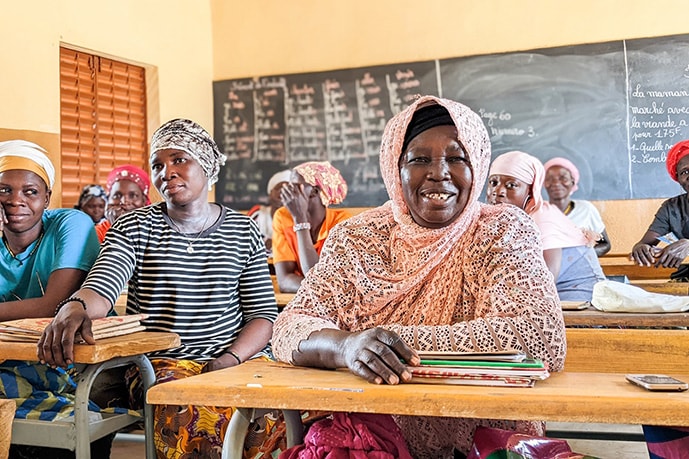
Adult Literacy Program Participant Burkina Faso. Photo: buildOn.
For more than 30 years, buildOn has been constructing schools in economically developing countries with the aim of eradicating poverty and illiteracy by providing access to education. In 2014, buildOn opened its first offices in Burkina Faso and three important programs were implemented: School Construction; the Enroll program, which seeks to bring out-of-school children back to the classroom; and the Adult Literacy Program, which helps men and women learn basic literacy and math skills so they can develop income-generating activities. buildOn targets communities with the greatest needs in each country and works hand-in-hand with rural populations to build schools, and empower more children and adults to be literate.
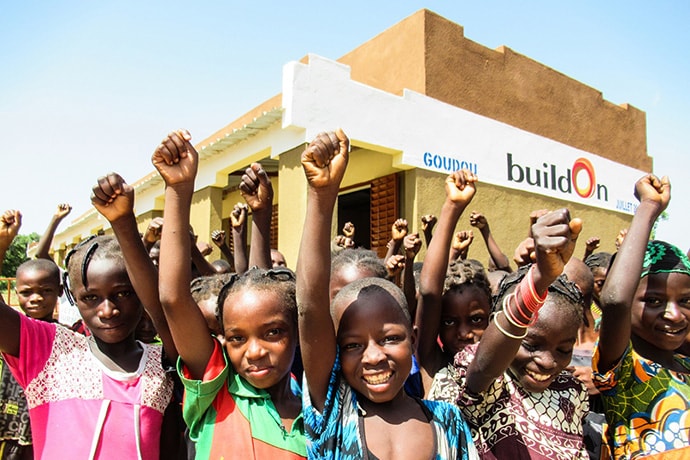
Students in Burkina Faso in front of their new buildOn school. Photo: buildOn.
Each construction project includes a block of three classrooms and two blocks of latrines. The communities buildOn partners with are located in rural areas which lack proper infrastructure, forcing students to study in confined, dark, and unfit shelters, or simply under trees when the weather permits. Some students chose to walk several kilometers to reach a nearby village with a proper school while others simply give up and decide to quit school altogether. At buildOn, we strive to build as many schools as we can to allow as many children as possible to get a proper education and break the cycle of poverty and illiteracy. However, it is not always easy, and here in Burkina Faso we have encountered several challenges–– especially in regards to gender discrimination.
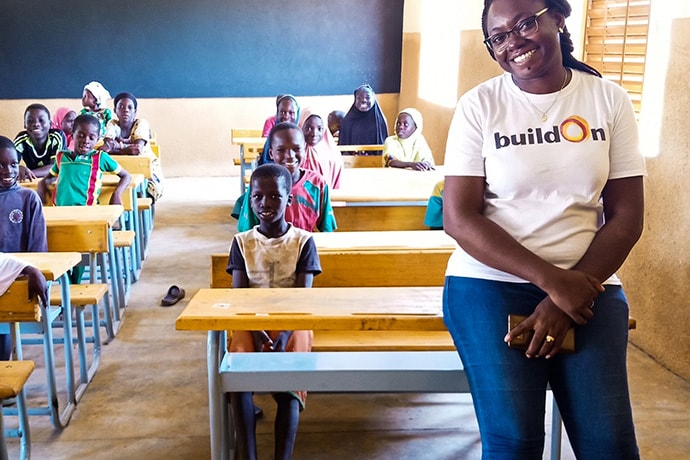
Jocelyne with students in a new buildOn school. Photo: buildOn.
At buildOn Burkina Faso we believe that the first step in battling gender discrimination is to start with our own team. We know that discrimination can arise within the workplace and that it can affect employees as well as the communities we work with. To prevent this, our office here in Ouagadougou has recruited candidates from diverse backgrounds regardless of their ethnicity, gender, or religious beliefs. As the Country Director, I work hard to promote a healthy environment for the employees which plays a huge role in their personal development. I believe that a happy team leads to better outcomes and thus far, I can proudly say that it has also had a huge impact on the work we have done. Even though our diverse team includes more men than women, more women are joining us––and the managerial team is led by three women in the roles of Country Director, Construction Manager, and Finance Officer. This proves that––despite prejudices and a lack of support for gender equity in Burkina Faso––that women can hold positions of authority.
These great women have proven to be valuable assets for the work we do by showing community members how important it is to educate girls. When we go to the field and the community members—especially women—see that a woman is leading, it encourages parents to enroll their girls in school. They realize how important education is, and they understand that gender discrimination has no place in the classroom. buildOn’s successful female staff are evidence that women can accomplish anything. Not only does this encourage parents to change their views on education, it also empowers young girls to believe in themselves and hopefully become financially independent one day.
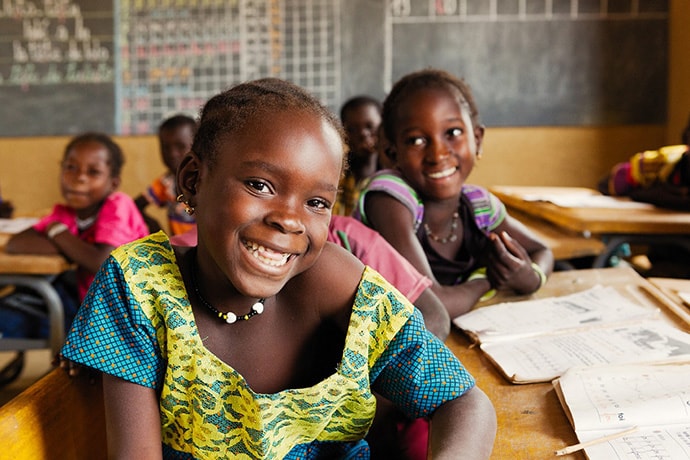
Girls learning in their new buildOn school. Photo: buildOn.
buildOn Burkina Faso’s female staff are very influential, which really benefits the School Construction Program, and the Enroll and Adult Literacy Programs. They have a particularly effective method of raising awareness and influencing communities––especially the women and young girls. They lead by example, and when they travel to partner communities (even when they are pregnant) this sends an important message that a working woman can still be a mother and a wife, as well as a role model in our society.
I did not grow up with the typical African traditionalist beliefs in the subordination of women; instead, I was always told that men and women are complementary. My parents also emphasized that I did not need to be perfect, but I should always be courageous. I have always lived up to what my parents taught me and I can say that this has allowed me to have a different outlook on gender roles. For many years now I have been an advocate for women’s rights, and I believe that all women– and even men– should continue to fight until there is equity and equality in education. Women should be able to make the decisions that are right for themselves and not hide behind fear or stereotypes. Even though a lot of positive changes have been made, there are still many parents who unfortunately continue to believe that sending a girl to school is not profitable for them. They believe that once their daughter gets married she will enrich the in-laws or that if she is too educated, she will not be submissive to her husband. They also believe that sending a girl to school encourages her to be in the public scene––which is reserved for males––when her place is in the kitchen.
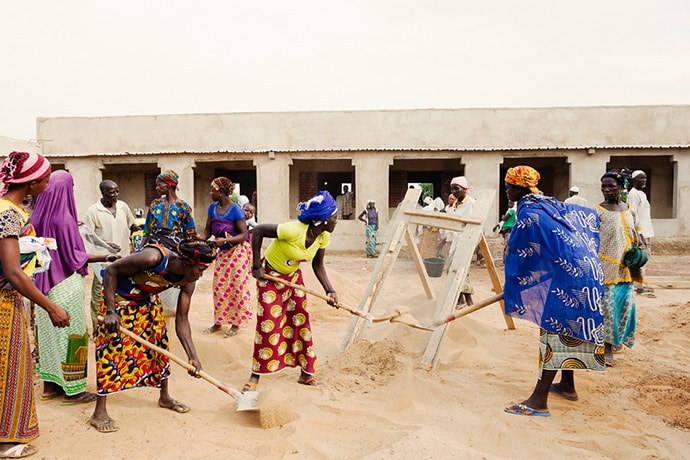
Women on the worksite building a new school in Burkina Faso. Photo: buildOn.
Beyond tangible investments (classrooms and latrines) buildOn continues to fight to raise awareness among our partner communities. We also want to increase communities’ civic engagement to improve gender equity and equality in education. When a community is interested in partnering with us, we evaluate their request to make sure it’s a good fit. In addition to location, we need to ensure that they can mobilize at least 200 people, including women, in order to break the socio-cultural and religious constraints that too often dismiss them. Then, during construction, women from the community work alongside our female staff, participating in activities such as digging the foundation, mixing cement, and making the ironwork and bricks. We also encourage women to participate in the School Project Leadership Committee in order to ensure the smooth running of the current project and any future projects. This allows men to acknowledge that women can be as efficient as them and that they should be considered as allies.
We want to have more schools built, but we also want to make sure that they are places for learning, free from discrimination. We want to ensure that the communities we work with recognize the significance of education, see its correlation with the reduction of poverty, and understand that it is a good investment for any of their children, regardless of their gender.
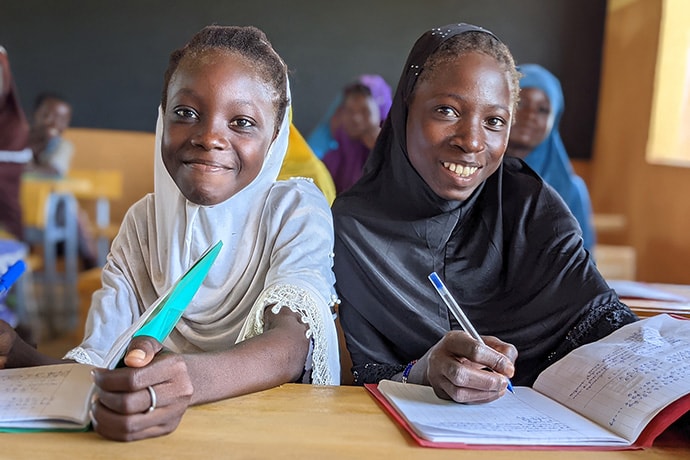
Girls in class Burkina Faso. Photo: buildOn.
All of our programs help women build a sense of empowerment and belief in themselves, and show them how they can organize within their own communities and make an impact. We empower women with information and knowledge, and with the belief that they can take command of their lives and make a difference in their families, communities, and country. In every community we partner with, we show them the positive impact that comes from investing in women, and teaching young girls how to lead collectively, as well as individually.
Although we have come a long way, there is still more to do, and we are ready!
To learn more, visit buildOn.org.